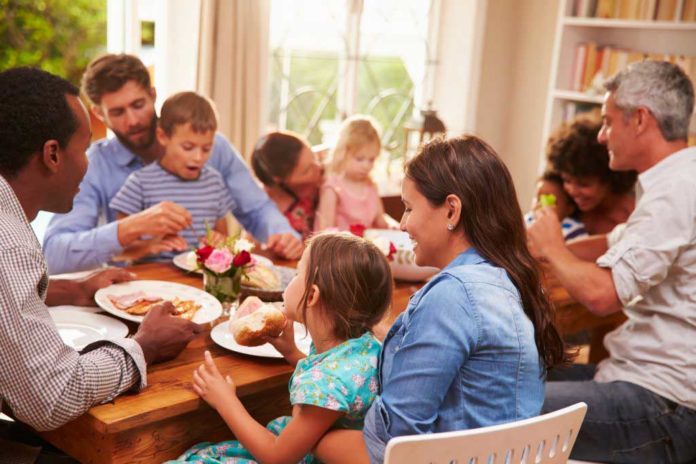People eat more when they eat in groups. This is known as the social facilitation of eating, which refers to the empirical fact that people eating with others eat more – often a lot more – than do people eating alone.
Previous studies found that eating with others lead to 48% increased food consumption than solo diners. When it comes to obese women, eating socially caused 29% more food intake than when eating alone.
In a new study by the University of Birmingham, scientists suggest that eating socially has a powerful effect on increasing food intake relative to dining alone.
For this study, scientists evaluated 42 existing studies of research into social dining. They explained that ancient hunter-gatherers shared food because it protected against periods of food insecurity. A similar mechanism can be found today that leads to increased food intake.
The study highlights that, as with many other species, humans tend to share a common food resource. Most humans are no longer hunter-gatherers, but mechanisms similar to those that once served efficient foraging continue to guide our dietary behavior.
Research leader Dr. Helen Ruddock, from the School of Psychology at the University of Birmingham, commented: “We found strong evidence that people eat more food when dining with friends and family than when alone. However, this social facilitation effect on eating was not observed across studies that had looked at food intake amongst people who were not well acquainted.”
“People want to convey positive impressions to strangers. Selecting small portions may provide a means of doing so, and this may be why the social facilitation of eating is less pronounced amongst groups of strangers.
“Findings from previous research suggest that we often choose what (and how much) to eat based on the type of impression that we want to convey about ourselves. Evidence suggests that this may be particularly pronounced for women eating with men they wish to impress and for people with obesity who wish to avoid being judged for overeating.”
Scientists noted, “In the case of social facilitation, we have inherited a mechanism that once ensured equitable food distribution, but now exerts a powerful influence on unhealthy dietary intakes.”
Dr. Ruddock commented, “Individuals compete for resources, and research suggests that eating more than others is likely to lead to ostracism, which, in turn, reduces food security. This creates a tension between an individual’s being seen’ to share food altruistically and eat as much as they need.”
“A solution to this tension may be to eat at least as much as others in the group — individual members match their behavior to others, promoting a larger meal than might otherwise be eaten in the absence of this social competition. What we describe as ‘social facilitation’ can be seen as a natural by-product of social food sharing — a strategy that would have served a critical function in our ancestral environments. This also explains why it is more likely to occur in groups with individuals who are familiar with each other.”
